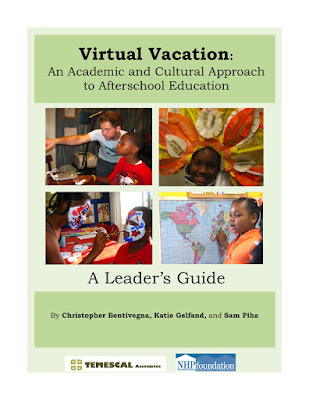By Guest Blogger Susan Neufeld
 |
| Susan Neufeld |
At the Best of Out of School Time (BOOST) Conference this past April, I had the pleasure of hearing Diego Arancibia (ASAPConnect) read “Ode to Site Supervisors,” a poem that captures the complexity of youth work. In our jobs, we feel the urgency to squeeze all that we can – accountability, life skills, love, validation – into a 3 to 6 p.m. schedule that also needs to offer a healthy snack and homework help. Our urgency is motivated by a realization that we want kids to find their voice and vision now while they are quickly changing. It’s a bit like building a ship while it sails.
Only, we don’t have to worry about building the ship. The LIAS Principles – that learning is active, collaborative, meaningful, supportive of mastery, and focused on expanding horizons – remind us that kids are the captains of their own development. Our role is not to fill kids with knowledge and skills but to be a compass that offers direction, guidance, opportunities, and support to find their own way.
Doing this is harder than it seems, particularly when most of us have a lifetime of assignment-driven schooling. Our instinct is to mimic a controlled, tightly scheduled, and rigid learning environment. But true learning is messy: it isn’t quiet or neat or easily captured in a worksheet. It is noisy, dynamic, and full of mistakes and spills and arguments. It is engaging, passionate, and so exciting that kids don’t want to go home.
 |
| Virtual Vacation Leader's Guide |
In our organization, we use Virtual Vacation (VV) to help create this learning environment for kids. VV is not a curriculum but a methodology for creating vibrant learning opportunities for youth. A Virtual Vacation Leader's Guide, developed in partnership between Temescal Associates and Chris Bentivegna, is available at this link. It is open-ended, hands-on, affordable (!), accessible to all ages, and allows kids to freely explore their world. In VV, youth determine where they would like to travel. They can go to a country (China!), a time in history (era of dinosaurs!), or a destination (under the ocean!) to explore, learn about other cultures, develop skills, and discover new interests. The staff’s role is to guide and facilitate what the group decides to see, do, understand, or create.
An Example
 |
| A Virtual Vacation to Japan |
At one of our sites, the youth decided that they wanted to visit Japan. As part of their trip, the children learned key Japanese words, made obis out of scrap cloth, celebrated the Lotus festival, made vegetable sushi rolls, practiced Japanese calligraphy, and researched the recent tsunami. Along this journey, they practiced soft skills (working and playing well with others, communication, negotiation, decision-making, leadership) and academic skills (internet research, reading, art, math, history). They also had a chance to visit a world outside their own, building their global and cultural awareness. For our youth, who all reside in or near low-income apartment housing, Virtual Vacations gives them opportunities once reserved for middle or upper income youth.
The Virtual Vacation approach is something I would recommend to any youth organization that seeks to engage youth in learning about the larger world. This approach weaves in a variety of academic disciplines and offers activities that bring distant people and places alive.
__________________________
Prior to her current position at The HOPE Through Housing Foundation, Ms. Neufeld served as the Collaboration Manager for Mustangs on the Move, a consortium of community-based organizations that provides after school programming to high school youth in Northwest Pasadena. She also worked for Communities Organizing Resources to Advance Learning (CORAL) Pasadena, a multi-city after school initiative launched by the Irvine Foundation, first as a program evaluator then as Associate Director. Ms. Neufeld holds a Master’s degree in Applied Developmental Psychology from Claremont Graduate University in Claremont, California. She currently serves on the Si Se Puede! Learning Centers Advisory Council of the Cesar Chavez Foundation, on the 2012 BOOST (Best of Out of School Time) Conference Leadership Team, and is a part of the Learning in Afterschool & Summer Work Group.







No comments:
Post a Comment